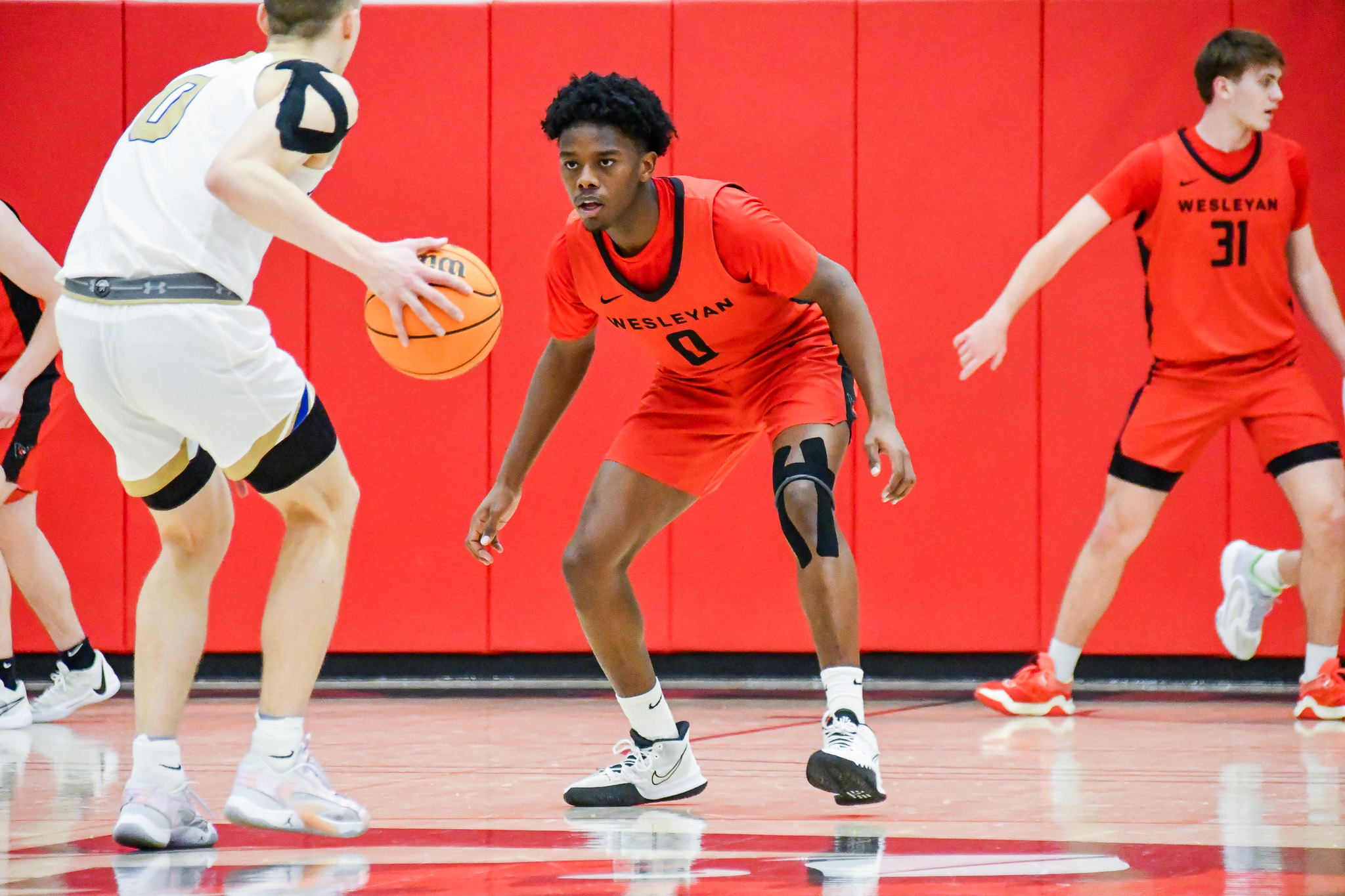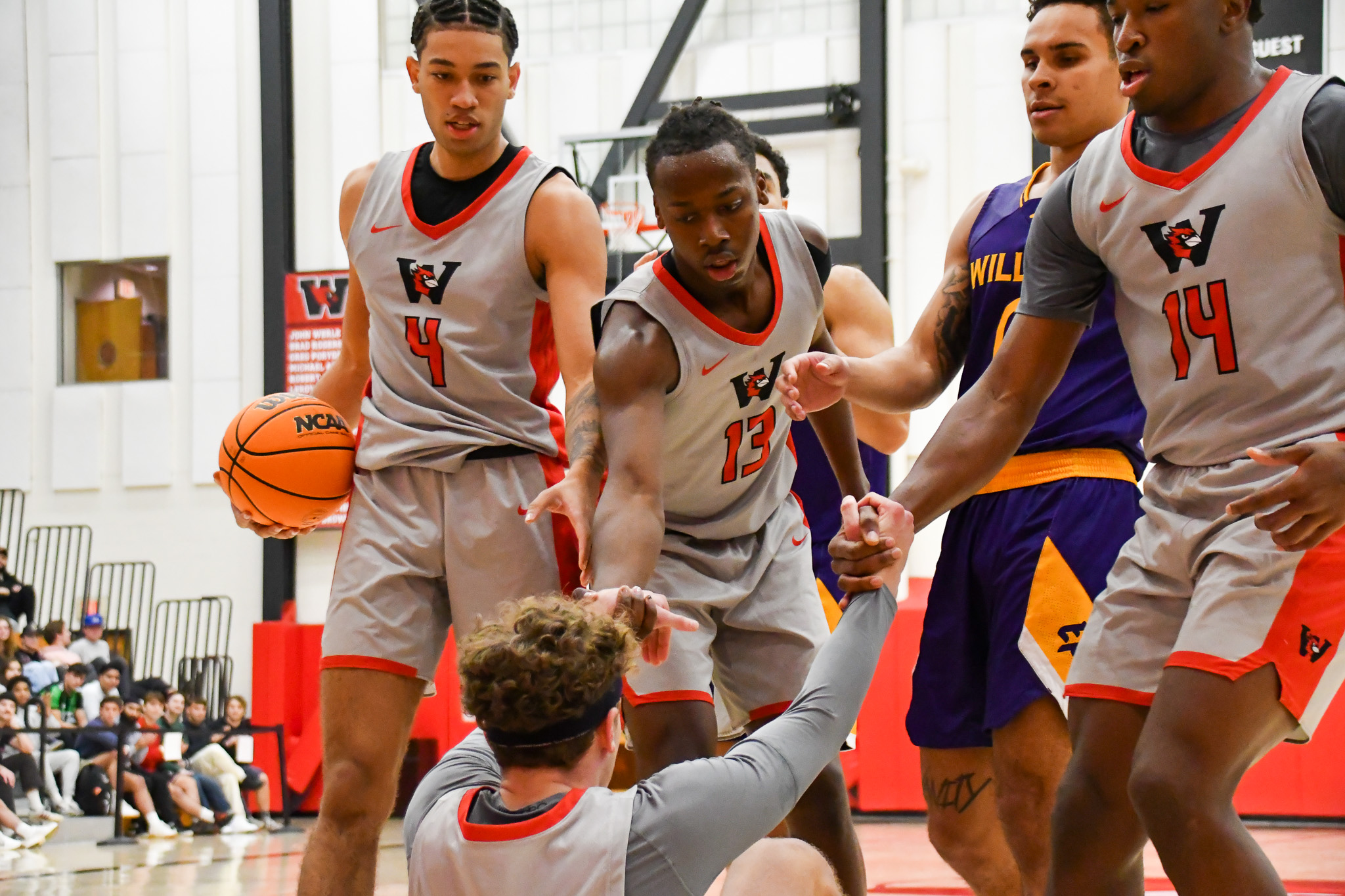
c/o Max Forstein
On Jan. 27, Wesleyan men’s basketball took on Hamilton, looking to break a three-game skid and take the next step toward the playoffs. Wesleyan came into the match 11–8 overall and 2–3 in conference, and with pressure mounting from other NESCAC teams, finishing the weekend with a win was all-important.
Neither team could figure out a way to pull ahead, and whenever the Cards began to build momentum, the Continentals answered by keeping the game close. The second half included a late go-ahead and-one by Shane Regan ’25 as well as two made free throws for Hamilton to tie it up, ending with the score tied at 68. The first overtime was more of the same, and Sam Pohlman ’26 hit a late free throw to send the game into double overtime. The tides turned in the last five minutes of gameplay, and Wes finally put away the Continentals 89–83.
The win was integral to keeping Wesleyan in playoff contention and meant a lot to the players. However, captain Steven Johnson ’23 MA ’24 acknowledged that there was more work to be done.
“It was a big energy boost because that was a celebration of the seniors, so we all had a team event after with a bunch of friends and family,” Johnson said. “But at the same time, we try not to get too low on the losses and so you can’t get too high on the wins. We already have the belief that we’re good enough to win, so we just had to just stay locked in.”

c/o Max Forstein
With much of the NESCAC seeding still up in the air, the regular season came down to the final four games, all of which were played on the road. Even with the heightened importance, Wes struggled to piece together wins, losing to Middlebury and Williams in hard-fought battles and falling to Tufts in an overtime duel. Despite playing highly ranked and highly regarded opponents, the Cards always stayed in games until the very end. Their largest NESCAC loss was by a margin of only 12 points, keeping matches close with nationally ranked teams like Trinity and Williams. When asked about what drove their ability to stay in games, no matter the opponent, players spoke of the team’s youth and tenacity on the court.
“I would say us being so young, and kind of ignorant to anybody being much better than us [allowed us to keep games close],” Jackson Cormier ’26 said. “We fought in every game, with no regard for rankings [or] what people were saying about us.”
Heading into their final game against Bates, the Cards were ready to make a statement and punch their ticket to the NESCAC playoffs. Even coming off three straight losses, the team remained in high spirits with a chance to make the postseason.
“We were excited for the opportunity that we had,” Shane Regan ’25 said. “We had a lot of close games against really good teams. So, we were excited to get our last games against Bates, and then to win by 20-plus points definitely meant a lot to us, And, obviously, it solidified our spot in the NESCAC playoffs.”
Regan, the team’s leading scorer throughout the season, led the Red and Black with 21 points in the clincher against Bates. The big win against the Bobcats slotted the Cards into a rematch against Trinity, a team they narrowly lost to earlier in the season.
On Jan. 20, the Cardinals played host to the Bantams in one of the closest battles of the entire NESCAC season. The two colleges went back and forth throughout the game, with each team one-upping the other as time expired in a tie. The two sides remained close in the sole overtime period, with Trinity reigning victorious, 79–77. Even though they did not win, the team looked back on that game with confidence that they could compete with anybody, no matter who they were on paper.
“Looking at that game, that was just another indicator,” captain Nicky Johnson ’25 said. “If you just clean up a few things, you can win that game. And those are the games you wanna play. When you’re playing against the really good teams, and it’s really close, that’s why you play. After that game, we hoped we would see them again. We can easily beat these guys as good as they are.”
On Feb. 17, the Cardinals flew north to Hartford, Conn. for their rematch against Trinity after the Bantams wrapped up their season 9–1 in the NESCAC, good for the No. 2 seed in the league playoffs. The opportunity Nicky Johnson and the Red and Black hoped for was staring them in the face, and they were hungry for revenge.
Trinity opened the game fiercely, jumping out to a 9–0 advantage early on. As Wes found themselves staring down a deficit, they chipped away at the Trinity lead until they tied it up halfway through the first half. After going back and forth for the next 10 minutes, the Cards held a two-point lead heading into the half, 29–27. In order to get ahead, the team got back to what they have done successfully all season: settling themselves and turning defense into offense.
“[Trinity] came out, and it wasn’t their main guys who were scoring early,” Cormier said. “We just [stuck] to what we knew and what we thought was going to work, and we limited them to not as many points as they are used to scoring. We upped the defense, and once we settled down on offense, we really got stuff going.”
Cormier, the team’s leading rebounder despite being a 6’4” combo guard, helped set the tone with his defense and rebounding. Cormier’s game-high 13 rebounds allowed Wes to get into a groove on the court and fight their way back into the game, an impressive accomplishment against the Bantams’ ruthless offense.
Although the Cards had the lead, there was no telling which school had the advantage heading into the final 20 minutes. But Trinity looked to set the record straight, getting off to a roaring start. They turned a back-and-forth game into a near blowout, as Wes fell behind 45–61 halfway through the second half.
Wes was in a spot they were all too comfortable with throughout this season: down by a sizeable margin with only so much time left to mount a comeback. If there’s one thing, though, that characterized this team over the course of the year, it was fighting until the buzzer sounded, no matter how large the deficit. The Red and Black found what worked for them that half, and they clawed their way back into the quarterfinal match.
“We got back to playing to our strengths, offensively,” Regan said. “We were getting up and down the court really well, and we had guys make good shots. That’s the most important thing. We were down 16, but I felt like they blinked their eyes, and it was a five- or six-point game. When you’re playing college teams, they can score in bunches. So, we definitely weren’t surprised by that.”
Regan’s 23 points helped the Cards cut the lead down to only two points with three minutes of game time left. The Bantams quickly hit two layups to pull ahead by six points with under two minutes remaining. After the Bantams missed the front end of a one-and-one free throw attempt, Nicky Johnson drove to the rim and hit a layup, bringing the Cards within four points. But from there on out, they were forced to play the foul game. Trinity hit five of their last six free throws, and the final buzzer sounded with Wesleyan losing 67–74.
Wesleyan battled through the game with fierce will and determination. The loss hurt the team, but the Cardinals are anything but discouraged.
“We out-rebounded them, [had] more bench points, we shot pretty similarly, but good teams are gonna win those games, and they’re gonna hit big shots,” Nicky Johnson said. “But no one’s ever out of the fight. It speaks to the talent we have, the guys we have, and the culture we have. You don’t like to lose, but when you look at that game, you can definitely see why there’s an excitement to just get back out there. We’re so close, and we are really good, but we can be even better.”
Nicky Johnson added to his resume this year by becoming the all-time Wesleyan assists leader and scoring his 1000th career point, the 27th Cardinal to hit that mark. But he is not done. He and the Cardinals will be back next season with nothing but more fuel added to their fire to succeed in 2024-25. All seven of the players who scored in the NESCAC quarterfinals will return—a degree of roster continuity that is seldom found in college sports. While this season did not yield the success the Cardinals hoped for, it was an invaluable building block for the future of the team.
Steven Johnson has a unique perspective on this season. As a freshman on the team, he and his teammates watched from a hotel TV as Bates eliminated the Cardinals from playoff contention, and only two years later they hoisted the second NESCAC Championship in program history. He knows the importance of struggle in building a great team.
“It may not feel like it in the moment when you’re walking off the court after losing, but those moments are what builds championship habits,” Steven Johnson said. “And then the next year and the year after, and when you do get there, and you do win a championship, you’re not just thinking of that season. You’re thinking of moments where you got all the ingredients, you got the championship DNA. The story of your championship has already started.”
Ethan Lee can be reached at ejlee@wesleyan.edu.
Max Forstein can be reached at mforstein@wesleyan.edu.
1 Comment
school uniform manufacturers in ahmedabad
men thats great very good..